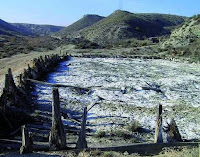The bleak countryside of Ciempozuelos, a village
about 35 kilometers south of Madrid, on the
border with the territory of Sesena (in the province of Toledo),
for its particularly arid, almost desert aspect, and the presence of a canyon
whose bottom is covered with high dry grass, it was used in several westerns.
In particular, an old abandoned country church (located immediately west of the
terrovia and the current highway), characterized by a bell tower on the fringed
west facade, towards the hills), some minor buildings and a fence wall, with
appropriate adaptations were used to represent a stagecoach station in the
Mexican style (with the addition of arches in the internal courtyard and on the
side of the church), a fortified farm or a fort, as in “The Secret of Captain
O’Hara” (1965) (this film is an
excellent example of the military western, with effective photography by Alonso
Nieva, and almost entirely shot in this cortijo, which was transformed into a
fort). “The Fury of the Apaches” (1964); “Kid Rodelo” (1965); “Fifteen
Scaffolds for a Killer” (1966); Ringo and Gringo Against All”(1966); “The Tall
Women (1966). Other films shot in this location are: “$2,000 for Coyote”
(1967); “The Hellbenders” (1967); “The Vengeance of Pancho Villa” (1967); A Man
a Colt” (1967) (only the canyon was used); “Between God the Devil and a Winchester”
(1968) “Thunder Over El Paso” (1968); “Ringo, the Lone Rider” (1968);
“Garringo” (1969); “Death on High Mountain” (1969); “A Bullet for Sandoval”
(1969); “Quinto Fighting Proud” (1969); “Adios Cjamango” (1970); “Another
Dollar for the MacGregors” (1970); “Reverend Colt” (1970); “The Long Days of
Violence” (1971); “Long Live Your Death” (1971); “What Am I Doing in the Middle
of a Revolution? (1972) (as a base for Leo Anchoriz’s guerillas); “Tunder Over
El Paso” (1972); “Raise Your Hands Dead Man, You’re Under Arest” (1972); “The
Three Supermen Out West” (1973); “Kill and Pray” (1973); “The White, the
Yellow, the Black” (1974).
Subsequently, the old church was purchased by
private individuals, who transformed the complex into a farm. The building of
the old church was renovated and became the owner's home; the bell tower (which
stands out well, even from afar, in many films), the construction still
maintains the solid rectangular shape and some sort of buttresses on the
southern side; a part of the old wall also survives. Next to this building,
instead of other old buildings, today there are large stables and a warehouse.
The land to the west, towards the hills, has remained relatively intact, which
in western films represented an arid and desert landscape, with harassing
pitfalls: attacks by Indians and bandits. In particular, at the beginning of
the hills, the area called "Las Salinas de Espartinas" has remained
intact, which appears in scenes from the films “The Fury of the Apaches”
(1964); “A Pistol for a Hundred Coffins” (1968); “Fifteen Scaffolds for a
Killer” (1968); “Ringo, the Lone Rider” (1968); “Another dollar for the
MacGregors” (1970) (the salt flats appear in full swing: Indians working in
slavery work there); “Raise Your Hands Dead Man, You’re Under Arest” (1972). A
few dozen meters to the west, it opens up and is surrounded by arid hills, a
canyon whose bottom is covered with high dry grass. When, referring to some
films, we mentioned the location of this set, we mentioned Sesena, which is a
nearby town in the province
of Toledo (whose
territory borders on that of Ciempozuelos). In
reality, both the old rustic church and the canyon are located in the territory
of the municipality of Ciempozuelos, therefore in the provincial of Madrid. Most likely it
was mentioned in Sesena because this set and location were reached by film
crews from Madrid through the territory of the
municipality of Sesena. The area in question is located
in the valley that opens at the foot of the new Valle Grande residential
district (in the municipality
of Sesena), which stands
on the left (towards the east) of the N IV - E% highway (autovia de Andalucia).
“The Tall Women” (1966)
Salt Pond today
“A Pistol for 100 Coffins”
“Another Dollar for the MacGregors” (1970)















No comments:
Post a Comment